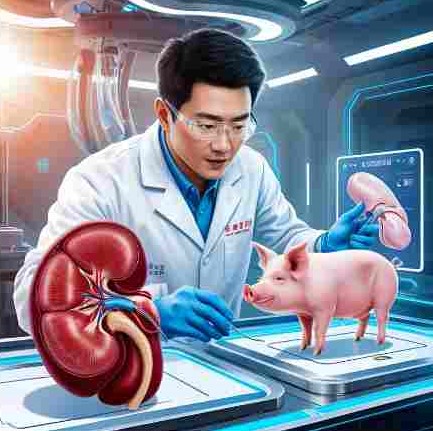China Makes History with Gene-Edited Pig Kidney Transplant in Human Patient
A Chinese medical team has achieved a major breakthrough in organ transplantation by successfully transplanting a gene-edited pig kidney into a human patient suffering from end-stage kidney disease. This marks a significant step forward in xenotransplantation—the process of using animal organs for human transplants—which could help solve the global organ shortage crisis.
A Life-Saving Operation
The groundbreaking surgery was performed on March 6 by doctors from Xijing Hospital of the Air Force Medical University. The recipient was a 69-year-old woman who had been battling chronic kidney failure for eight years. She had been undergoing dialysis three times a week but was unable to find a suitable human kidney donor. As her condition worsened, complications from dialysis began to emerge, leaving her with limited options for survival.
To save her life, doctors implanted a gene-engineered pig kidney into her body. As soon as blood flow was restored, the transplanted kidney turned pink and began producing urine—a sign that it was functioning properly.
Encouraging Early Results
Within just three days after the surgery, the patient’s kidney function showed remarkable improvement. Her serum creatinine levels—a key indicator of kidney health—dropped to normal, suggesting that the kidney was successfully filtering waste from her blood. By the sixth day, she was stable, and her urine output peaked at 5,468 milliliters in 24 hours, further proving that the new kidney was working well.
The medical team closely monitored her progress, watching for signs of immune rejection, blood clotting disorders, or infections, which are common risks in organ transplants—especially in cross-species procedures.
The Growing Need for Organ Transplants
Kidney failure is a growing health crisis in China, with an estimated 130 million people suffering from chronic kidney disease. Millions of them reach the end-stage phase every year, requiring transplants or lifelong dialysis to survive. However, organ donor shortages remain a critical issue worldwide, leaving thousands of patients without lifesaving transplants.
Xenotransplantation, or using animal organs for human transplants, is emerging as a potential solution to this crisis. Scientists believe that gene editing technology can make pig organs more compatible with human bodies, reducing the risk of rejection.
A Global Effort in Xenotransplantation
While this is China’s first successful pig kidney transplant into a living human, at least four similar transplants have been performed in the United States.
- In November 2023, a U.S. patient received a pig kidney transplant and became the longest-surviving recipient of a pig organ.
- In January 2024, another patient received a pig kidney and has survived for over a month.
China has also been making progress in xenotransplantation research. In April 2023, Xijing Hospital performed the first-ever pig liver transplant into a brain-dead patient. One month later, a team at Anhui Medical University transplanted a gene-modified pig liver into a living patient with severe liver cancer.
Additionally, last year, Chinese scientists successfully transplanted a pig kidney into a macaque monkey, with the organ functioning for over six months—a key milestone in proving the long-term success of pig-to-human transplants.
The Future of Xenotransplantation
The successful transplant of a pig kidney into a human patient in China is a major step toward making animal organ transplants a reliable medical option. However, challenges remain, including immune system rejection, infection risks, and ensuring long-term functionality of the organ.
Professor Dou Kefeng, who led the Xijing Hospital transplant team, believes that xenotransplantation could be a game-changer for patients waiting for organ transplants.
“Xenotransplantation could be a key way to solve the organ shortage problem and offer new hope for many patients,” he said.
If future trials prove successful, gene-edited pig organs could become a lifesaving alternative for millions of people worldwide.









